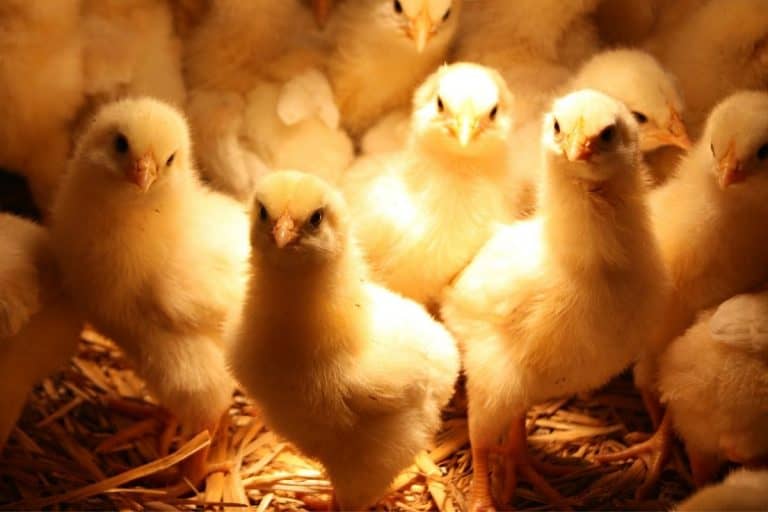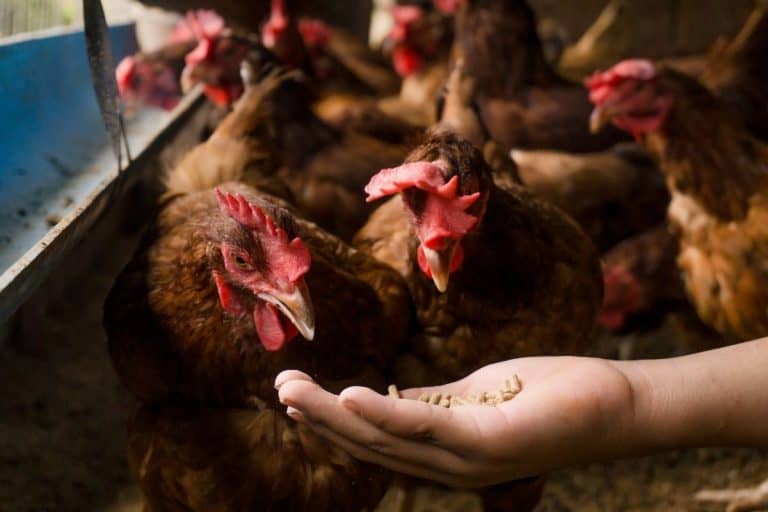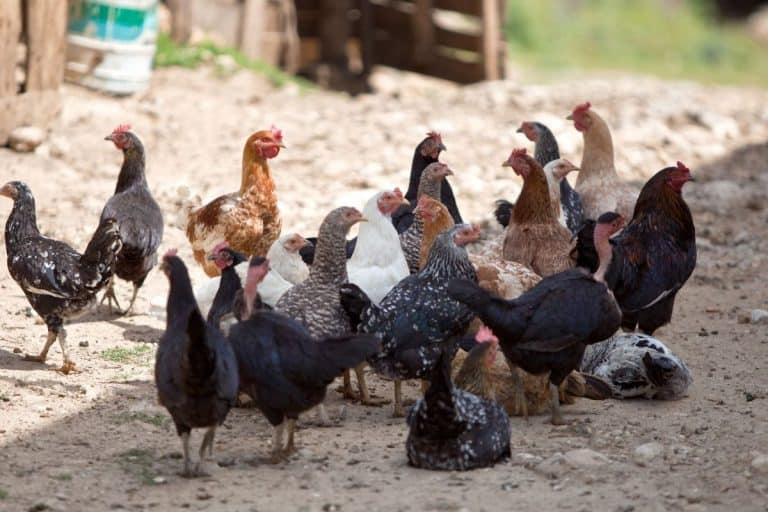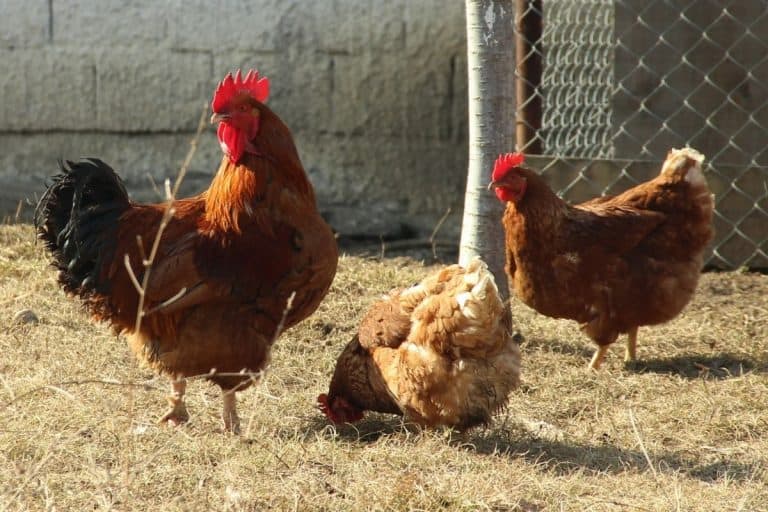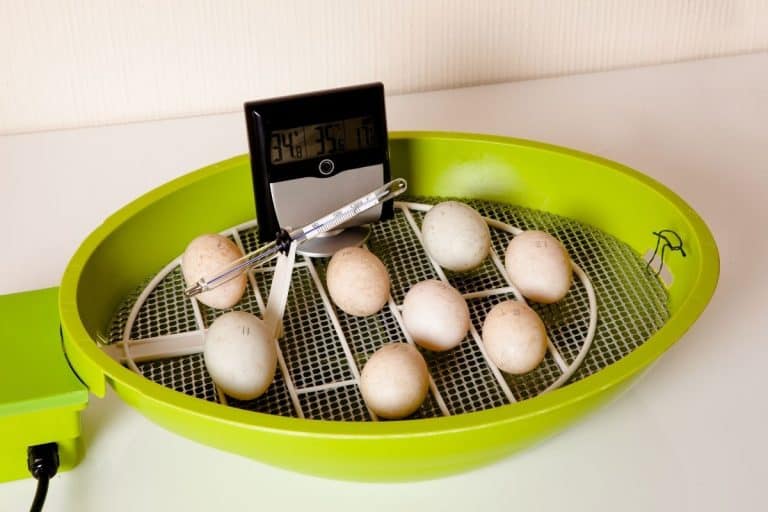How Many Chickens Should a Beginner Start With?
If you have been thinking of getting some chickens, you might not be sure how many you should get for your family. There will be constraints on your ability to provide enough space for their needs depending on your location, and there is a wise number of chickens to start out with when you are first getting used to having chickens for the first time.
As a general rule, start with five chickens minimum, and work your way up from there. The number of eggs that you consume in a week will also predict the number of chickens you need. Then, if you live in town, you will be limited by local laws and the yard size.
If you want to learn more about keeping your own flock of chickens, read on for more information!
But before you dive into this topic, did you know I've got a page packed with my go-to chicken stuff? From the best feed to handy tools, it's all there. Don't you want the best for your flock? Check it out right here.
How Many Chickens Can I Keep in My Yard?
If you live in the city, you might be limited as far as space in your yard. As previously mentioned, there can be restrictions on the number of chickens that you can have in your yard based on what the county or the city will allow.
You should check into this number before you start adding to your flock, and then find out that you are not allowed to have the number of chickens that you have bought in your backyard.
If you do not have city bylaws to consider, and you live on acreage, you can probably have as many chickens as you want to have over time. If you are not sure what each unique variety of chicken prefers for space, you can do some research into that detail. Below is a chart of the amount of space that you will need on average per chicken.
| Family Size | Chickens | Square Footage Needed |
| 2-4 | 2-5 | 20-50 |
| 4-6 | 5-10 | 50-100 |
| 8+ | 10+ | 100 + |
These numbers are average figures and if you pick a large variety of chicken, you will find that you might need more space for them to range and eat. Some of the larger breeds will need more space to roam as well as more space to happily co-exist.
Wait, I have some recommendations for you!
Before you go any further, I want you to take a look at some of the recommendations I've handpicked for you. I think these are essential items you should have for your chickens flock. You can check them out and buy them directly from Amazon.
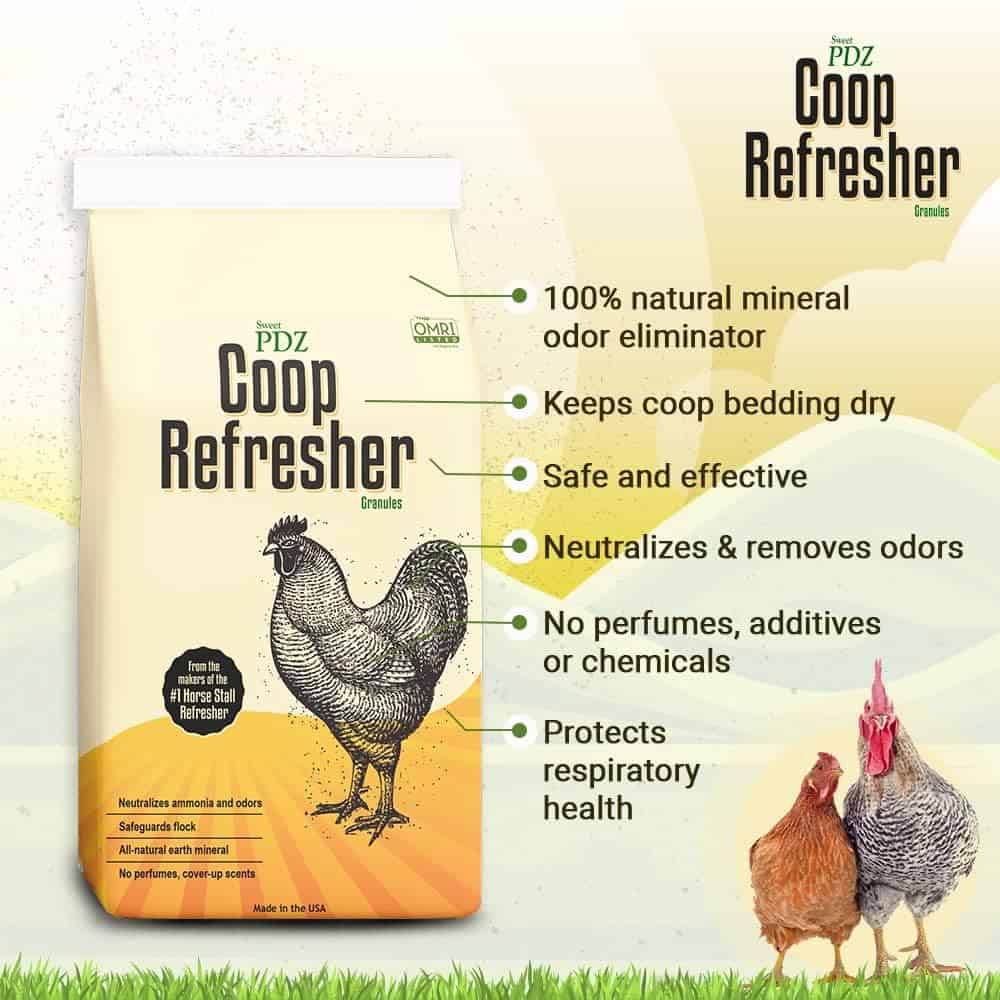 | 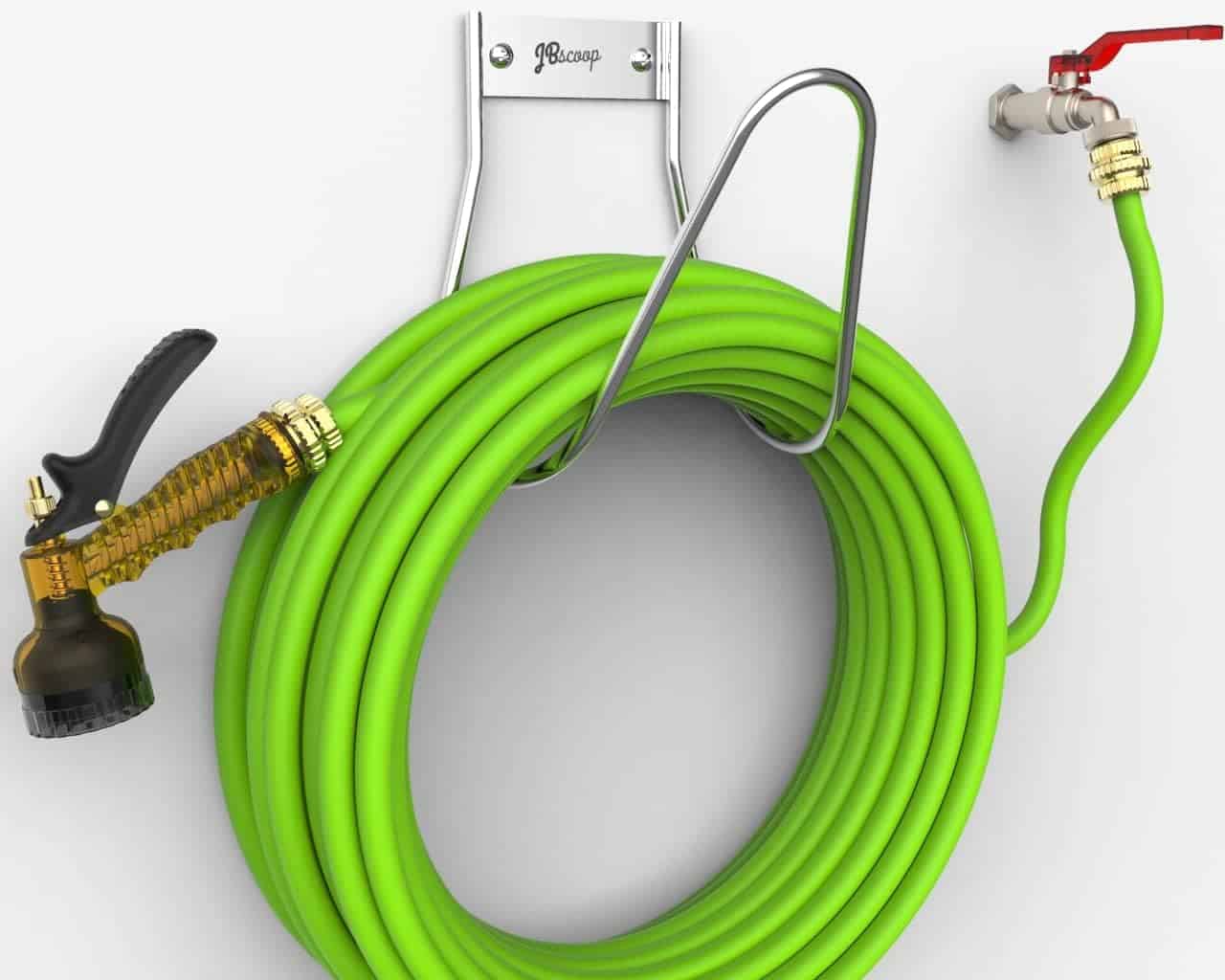 | 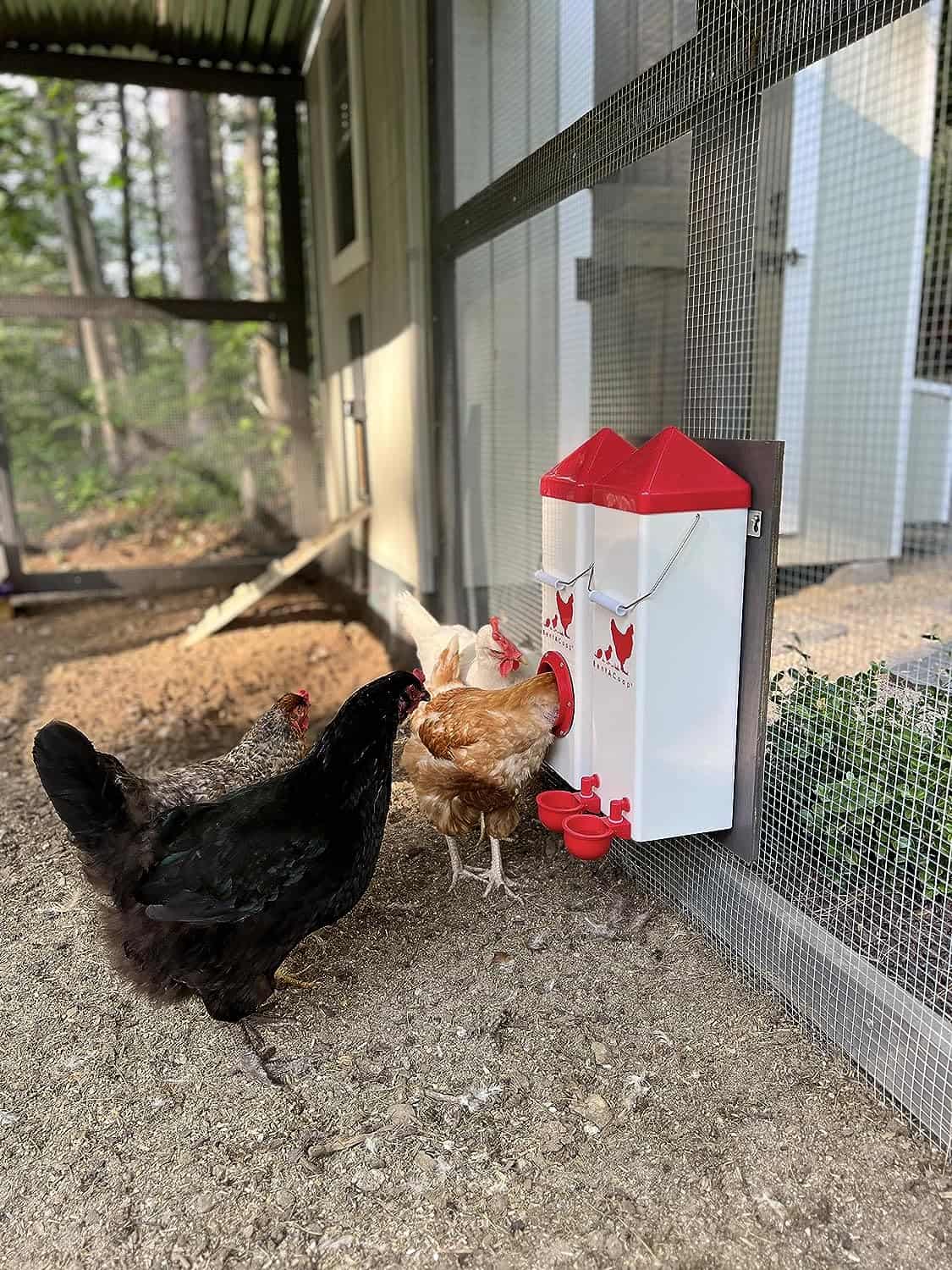 |  |
| Essential accessory for your coop | No more tripping over hoses! | Predator protection made easy | Comfort + style is possible |
What is the Minimum Number of Chickens You Should Have?
Chickens are never going to be happy by themselves. You will need to have three chickens at minimum to make sure that they are happy with their situation in your yard.
You might think that this is many chickens, but chickens are very easy to care for, and you will not notice a big difference in the upkeep of this number of chickens until you exceed ten chickens or so.
Chickens are social and like to roost in groups, so having a small flock at minimum is essential for them to be happy. You will find that they will lay eggs better and be more content if they have a little flock to live with.
If you have less than three chickens you will notice that they are not laying as many eggs as they could. The average laying for a flock of chickens that is three or larger is about a dozen eggs every week. You will see many fewer eggs than this if your flock is two chickens or less.
Chickens that are alone will almost always stop laying eggs and might stop eating due to depression.
How many chickens should I get for a family of 4?
If you have a family of four to six people, you will need five to six hens at minimum. The number of eggs that you consume in a week is going to predicate the number of chickens that you need for this size family as well.
In fact, I asked this question in a poll on Reddit, here are the results:
| Number of chickens | Votes % |
|---|---|
| 1 | 0% |
| 2 | 2.83% |
| 3 | 13.21% |
| 4 | 37.74% |
| 5 | 23.58% |
| More than 5 | 22.64% |
So, as explained in the comments of this poll (here), 4 to 6 seem a good range to get started. Then you can add more the following years depending on how it goes.

If you love eggs and eat lots of them, you will need to consider that you can get about a dozen eggs every week from three chickens.
You may need more chickens to handle the large demand for eggs. Laying issues can also lead to slowdowns in your chickens’ production, and you will need to keep an eye on these factors, as they can be early signs of issues in your flock related to disease or depression.
Chickens that are not laying well are usually sick or upset in some way. You will need to be sure that you are providing them with the right roosting environment as well as a yard to exercise in if you want your chickens to lay eggs consistently. Always make sure that you are feeding them correctly for their overall health needs as well.
How Many Chickens Do You Need for a Dozen Eggs a Week?
As a general rule, at least three chickens are needed to get a dozen eggs a week. Since laying rates are not always predictable, five chickens would be a safer choice to guarantee a dozen eggs per week.
You might need to have these two extra chickens to make sure that your egg-laying numbers stay up around a dozen on average every week.

Chickens are not terribly long-lived as well, so you should consider raising some chicks to fill out your flock when you have aging hens. Older hens often lay a lot less frequently than younger hens, so if you are bringing up babies to fill out your flock, you will have more consistency in your chickens’ production.
How Many Eggs Will Three Chickens Produce?
Three chickens will produce about a dozen eggs per week. You might see some ups and downs in this number due to seasonal changes and other inconsistencies that can happen, but your chickens should stick to this average most of the time. Chickens are usually consistent layers if they are happy and well-fed.
You might want to consider getting five chickens if you want to stick to this number of eggs each week for sure. This will help even out the ups and downs of production that might come to pass. You could end up with extra eggs some weeks, but this should not be a burden if you love eggs.
On average, each laying hen produces 296 eggs per year.
United Egg Producers
Some varieties of chicken will produce more eggs than this, while others will produce far less. Make sure that you research the variety of chicken that you are thinking of investing in.
The breed of chicken can make a big difference in your overall egg production each week. Besides this, some breeds of chicken are easier to care for, and you should aim for these breeds when you are just starting out.
Beginners should never lean toward large, delicate breeds of chicken that might need lots of extra care. This can lead to many issues that can be avoided by investing in more low-maintenance breeds of chicken.
How to Care For Chicks
If you are ready to add to your flock, you might be wondering what you need to do to care for chicks. Chicks are darling and fairly easy to care for. You can add to your flock easily by buying chicks from your local feed store or livestock outlet.
Keep your baby chicks in a confined area with a heat lamp on them. They will need to be kept warm for about eight weeks. They need feathers before they will be able to handle temperature changes. They grow fast and you will feel like this time will fly by.
If the weather is fifty-five degrees or higher, they can be mixed into your flock once they are mature enough. You will need to be sure that you do not overwhelm your living space for your flock when you add these new chickens into your flock.
What to Feed Laying Hens
No matter how many chickens you have in your flock, you need to feed them properly to make sure that they have the nutrients that they need to lay eggs every day or close to it. You also want to encourage strong eggshells. There is nothing more frustrating than picking up eggs that shatter in your hands.
If you want to be sure that your chickens are getting the right feeding protocol, you should always make sure that they are getting a complete feed. There are brands that make this kind of feed (here is an example on Amazon). This kind of feed has the right amount of omega-3 and calcium in it to support strong eggshells and healthy chickens.

Chickens that are laying need around 4 grams of calcium in their daily feed and they will need 2 grams of calcium for each eggshell. You will also need to be sure that they have vitamin D3 for their optimal health. There are oyster shell mix feeds that you can give your flock if your eggshells are too thin.
40% of the shell is calcium and this cannot be delivered to the shell without the carrier of D3 to make sure that the calcium gets to where it needs to go. You will find that the average chicken will lay about 180 to 200 eggs in a year which amounts to about .88 pounds of calcium in a year for eggshells that are strong!
Strong shells make sure that egg safety is complete and thorough. You do not want thin shells for many reasons and sanitary eggs are just one of these reasons. Healthy eggs are clean and sanitary as well as delicious and you want to be sure that you feed your flock correctly to ensure that the eggs that they are laying are going to be safe to eat.
What Kind of Roosting Environment do Laying Chickens Need?
Many people who are new chicken owners are not sure about how to create the right roosting environment for their flock. This is an essential part of making sure that your chickens can lay eggs in comfort. You will need to make sure that your laying locations and roosting locations are ideal, or you will not get the most out of your flock.
Chicken roosts need to be placed inside boxes or houses that are sheltered from view and the weather. There are a few breeds of a chicken who will lay eggs on the ground or in the grass, but this is not common. Most chickens will not lay eggs unless they have a safe place to roost off the ground.
Your chicken boxes should be about 1.5-3 feet high, with easy access to the boxes that you have built. Make sure that you create perches that are flat and offer lots of room for straw and sleeping hours on flat chicken feet. Chickens are not like songbirds that can sleep with their feet gripped around a rod or a dowel.
Change out the straw that is in your roosting box every week and make sure that you make room between roosting spots. You will not want your chickens to be clustered too close together. They will need about 8-10 inches between each roosting spot.
In summer, your chickens will want to spread out a bit more for comfort, and you might want to create roosting spaces that are a bit farther apart than this. You will want to have nesting locations for roosting about the floor of the coop. Some chickens will be happy to lay eggs on the ground inside the coop, but this is not common for most breeds.
What Can I Do to Improve my Chicken Roosts?
If you have chickens already and feel that they could be laying better, you should look at their diet first and your chicken roosts second. Roosting locations can make a big difference in your chickens’ willingness to lay eggs.
You should always make sure that your roosting locations are smooth and straw-covered. You want to prevent sharp edges in your laying locations that might lead to foot diseases and injuries.
Foot diseases like bumblefoot can lead to a hen that will not lay eggs, and you will end up with a vet bill to pay as well. Injured chickens will not be able to hop up and down to roost, which can lead to other problems with their health.
Another issue that can lead to many issues with laying are laying spots that are too narrow. Roosting locations that are not wide enough for chickens or that have a ledge at the front can lead to injuries to the breast bones of the chickens. These injuries can cause infection and might even cause your chickens to die.
You should also consider pecking order within your flock. Your flock will have top hens in the pecking order, and they should be able to have higher places in the roosting locations in your coop. If you only have one level of roosts in your chicken coop, you might find that there are issues with your hens laying due to a lack of room for them to exercise their pecking order.
Always make sure that you are cleaning out the roosts weekly to prevent issues with mites and other diseases that might lead to health conditions that could restrict laying. Mites and other kinds of pests might seem normal if you have always dealt with them in your flock, but you can avoid them by cleaning your coop correctly and frequently.
Does Temperature Affect Laying?
Temperature can affect laying. Winter can lead to cold feet on roosts, which will make chickens stop laying in most cases. You can get around this by closing in your coop and making sure that there is plenty of straw on the roosts.
You might still see a reduction in egg production, but it will not be as dramatic.

If it is very hot, you can also see a reduction in roosting and laying, but you can help with this issue by spreading out the roosting locations some when you clean and making sure that your hen house opens up on numerous sides to get some air circulating within it. Your chickens will thank you for the extra breeze and will lay much more effectively than they did before.
Having Your Own Chickens is Very Rewarding
No matter what size your flock is, you will love having your own chickens. They create food that you can eat and they are smart and interesting animals to add to your property. You will find that caring for chickens is not nearly as hard as caring for many other kinds of animals and a happy flock is largely self-sufficient.
Laying hens can produce quite a lot of food and you will save money over buying eggs at the store. Laying hens also make eggs that are far more flavorful than store-bought eggs and that offer more nutritional value overall than mass production eggs.
For many people, having their own flock of chickens is a way to break the cycle of buying produce that is mass-produced at great cost to the animal and the consumer. Getting your own flock of chickens can make it much easier to feed your family well and to enjoy a more rural way of living life.


